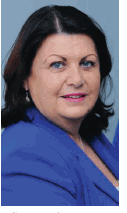|
News & Views item - July 2012 |
![]() European Commissioner for Research, Innovation and Science, Máire Geoghegan-Quinn,
Talks Up European Basic Research. (July 21, 2012)
European Commissioner for Research, Innovation and Science, Máire Geoghegan-Quinn,
Talks Up European Basic Research. (July 21, 2012)
 Prior to becoming European Commissioner for Research, Innovation and Science the
Irish politician Máire Geoghegan-Quinn served as a Fianna Fáil Teachta Dála (TD)
for the Galway West constituency from 1975 to 1997, and prior to that she was
Minister for Tourism, Transport and Communications (1992–1993) and Minister for
Justice (1993–94). She has no scientific background.
Prior to becoming European Commissioner for Research, Innovation and Science the
Irish politician Máire Geoghegan-Quinn served as a Fianna Fáil Teachta Dála (TD)
for the Galway West constituency from 1975 to 1997, and prior to that she was
Minister for Tourism, Transport and Communications (1992–1993) and Minister for
Justice (1993–94). She has no scientific background.
Nevertheless in her June 29, 2012 editorial for Science she presents as a strong advocate not just for science in general but also very much for the "European Research Council, which in its first 5 years has already helped more than 2500 top researchers to follow their curiosity".
Below some excerpts:
Scientists' passion for their work is infectious and has driven me to give them all the support I can. I am not a scientist, although I have gained a deeper appreciation for science in recent years. What I am is a politician. That means that what I understand well is the business of using scarce resources in the best way possible. At the moment, budgets are very tight in Europe and elsewhere. It is clear to me and my colleagues in the European Commission (EC) that a greater portion of those scarce resources must be devoted to science.
[However], there is a real risk that science might be seen as a luxury as governments look for budget cuts. On a more fundamental level, scientific knowledge may even be at risk of losing its pre-eminent position in this modern information society. Science is a necessity, not a luxury. ...policy-making more [is] complex than ever, and informed decisions require the best evidence-based knowledge and advice we can produce.
...for me, scientific enquiry is important in itself. Curiosity-driven science defines and shapes human progress. The Large Hadron Collider may generate spinoffs and business opportunities, but it has a noble quest: to address some of the most fundamental questions of physics, advancing our understanding of the most fundamental laws of nature.
The EC recognizes the need for more science. That is why we have proposed an increase from €55 billion to €80 billion for our 7-year research budget, to fund our future research and innovation program Horizon 2020. Starting in 2014, Horizon 2020 will fund everything from the best frontier research to close-to-market applied science. But the old models of doing science from on high are obsolete. We have to collaborate more widely across countries and across disciplines to meet our current challenges. We have to explain better what science is doing and why, in language that non-scientists can understand. We need to encourage more children to study science, not just so they can participate in the knowledge economy, but because a basic understanding of science is essential for living in an ever more complex and technological world... science matters, now more than ever.